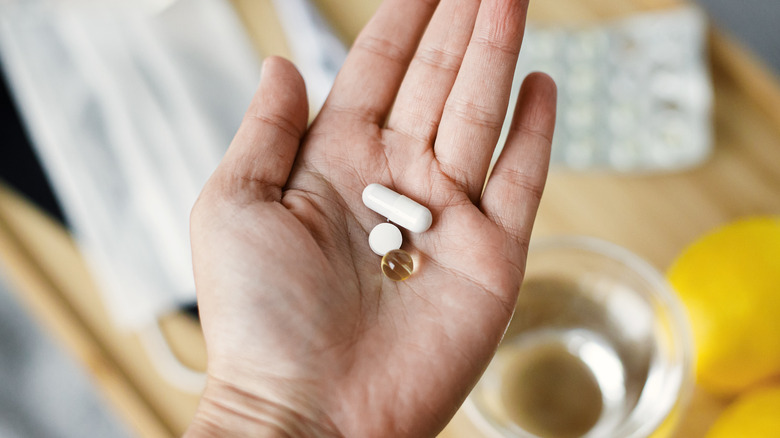Here's What Taking Zinc Can And Can't Do For You
The drugstore supplement aisle is a confusing maze of bottles and boxes — one that consumers have increasingly started to navigate. The supplement industry has grown exponentially — especially after the pandemic gave it a boost — and was valued at $140.3 billion in 2020 (via Grand View Research). According to the FDA, supplements serve a multitude of purposes that range from disease prevention to supplying the system with an adequate amount of important substances.
Zinc is a common supplement that's considered an essential nutrient for vital functions. It creates proteins while supporting your immune system and various other biological processes (via Healthline) — including keeping your skin healthy. Considering its immune-boosting benefits, many have also taken it as a supplement to counteract diseases like COVID-19, HIV/AIDS, and the flu. However, evidence suggests that it isn't effective in combating any of those (via WebMd). Nevertheless, zinc can help with many other processes and conditions. Fortunately, most of us have our plates filled with zinc but if you're one of the few who is deficient in this mineral, supplements can be a great alternative (via WebMd).
Too much zinc can be toxic
The recommended dietary allowance of zinc is 8 mg per day for women and 11 mg for men, according to the National Institutes of Health (NIH). Fortunately, zinc deficiency is rare. "It's involved in nearly every biological process," Michael Hambidge, a professor at the University of Colorado School of Medicine, tells Health. "And because its functions are so diverse, symptoms of a deficiency are also diverse." Symptoms can range from diarrhea, hair loss, and skin rashes; people who are vegetarians, pregnant, and frequent drinkers are most at risk (via Healthline).
The potential benefits of taking zinc supplements include lowering your blood sugar, slowing the progression of age-related macular degeneration, and even clearing up acne (via Everyday Health). You can also use zinc to reduce the number of days you stay in bed with a cold as it is known to boost the immune system; many use nasal sprays and lozenges for this purpose. But before you do, speak to your doctor — zinc nasal sprays can also cause the loss of smell (via Mount Sinai). Finally, hospitals also use zinc to treat burns and cuts as it can accelerate wound healing, Healthline notes.
Considering how readily available they are, you may be tempted to bring zinc supplements home. However, excessive doses of zinc can also be toxic for you, causing deficiencies in other nutrients like copper and iron while reducing good cholesterol (via Healthline). Either way, speak with your healthcare provider before taking zinc.

